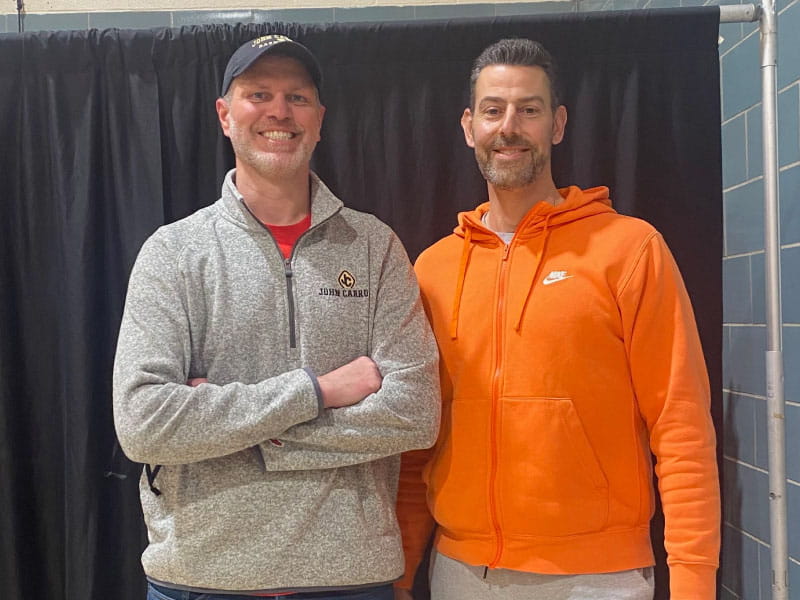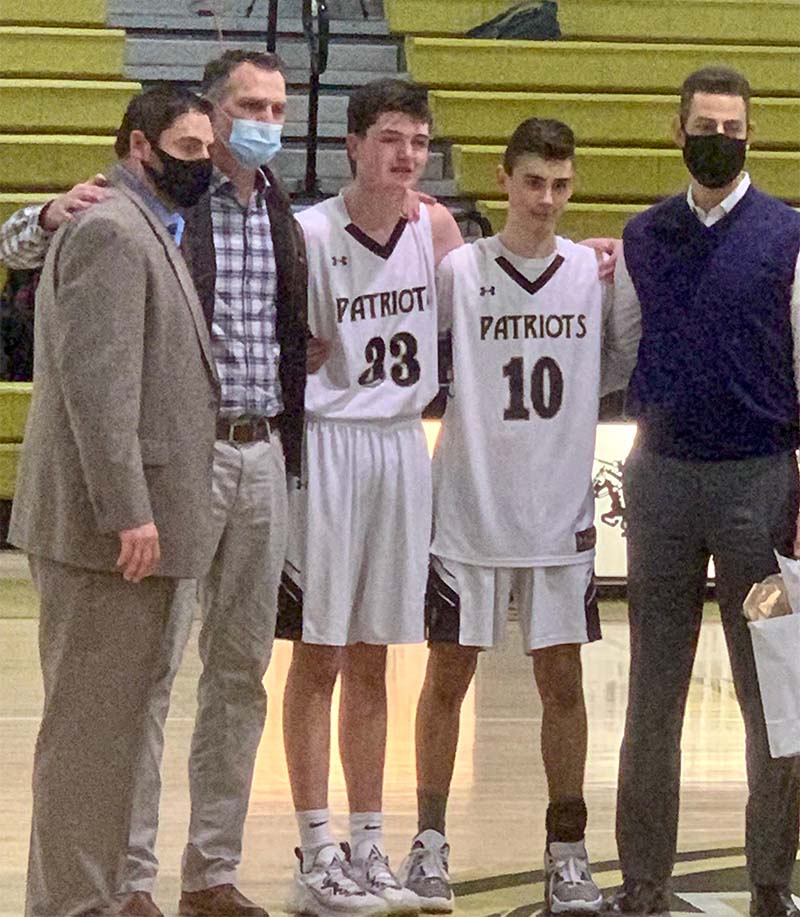He collapsed after 2-on-2 basketball game against his son. His teammate saved his life.
By Deborah Lynn Blumberg, American Heart Association News

On a sunny fall day, Baltimore dads Joe Greco and John Holschuh teamed up to take on their teenage sons in a game of 2-on-2 basketball in the Greco family's driveway.
The boys were tough foes. Teammates on their high school squad, the teens pushed their dads hard for an hour, leaving Greco and Holschuh tired and needing a break.
The boys went inside to play video games. Greco and Holschuh, who played basketball in college, lingered in the garage, cooling down and chatting about sports.
Twenty minutes into their break, Holschuh looked at Greco and said, "I'm starting to feel … "
And then he passed out.
Greco caught his friend, keeping him from hitting his head on the concrete floor. Holschuh – who was 49, exercised regularly and seemed to be in good shape – was breathing heavy. His eyes rolled back into his head.
Greco thought Holschuh was having a seizure, so he cleared the area of anything that could hurt Holschuh. Then Holschuh stopped breathing.
Greco ran into the house and told his son, Joey, to call 911. Then he began CPR, just as he'd been trained to do.
Greco works at the country's largest maritime terminal operator. Every two years, the company provides employees with CPR training.
About a minute into Greco delivering chest compressions, Holschuh started breathing. Then he stopped. Greco restarted CPR and Holschuh began to vomit. Holschuh started breathing only to stop once again. Greco's son had the 911 operator on the phone, and she coached Greco through CPR. He continued chest compressions for the next 10 minutes.
A volunteer firefighter who lives in the neighborhood heard about the emergency over the dispatch radio. He came over and helped Greco with chest compressions until the ambulance arrived. Paramedics restarted Holschuh's heart with a defibrillator.
"We were all standing there holding hands and saying a prayer for John that he could fight through it," Greco said. "Then they shocked him again, and there was a heartbeat."
Greco called Holschuh's wife, Dawn, to tell her what had happened. He followed the ambulance to the ER so he could tell doctors, too.
Later that night, Dawn called Greco with an update. Holschuh had a pulse, but he was in a medically induced coma. Greco went to bed not knowing what would happen to his friend.
Early the next morning, Dawn called him again.
"There's someone here who wants to talk to you," she said.
Hearing Holschuh's voice, relief washed over Greco.
"This was the scariest situation I've ever been in," he said. "I was bound and determined not to have these two boys experience the passing of a father and a family friend."
Holschuh stayed in the hospital for 10 days. As he recovered, doctors began the search for why his heart stopped.
Ultimately, doctors suspected he'd had a spontaneous coronary artery dissection, or SCAD, which is when a tear develops in a blood vessel in the heart. It's a rare event; rarer still is for it to occur in a man.
Holschuh had an implantable cardioverter defibrillator, or ICD, placed inside his chest. ICDs are small battery-powered devices that detect and correct irregular heartbeats by delivering electric shocks when needed.
Now, a year later, Holschuh only needs to see his cardiologist annually. At first, he was conscious of the scar from his ICD. It's also sometimes uncomfortable when he wears a seatbelt or his hiking backpack.
He's found other ways to get exercise in, including swimming.
"My doctor said, 'You can run a marathon, you just can't win,'" he said.
That means Holschuh can still play 2-on-2 basketball with Greco and the boys, but he can't overexert himself.
"I know I have to be more gradual in my fitness," he said. "It's an interesting shift."

He's grateful, too, to Greco for his quick thinking in an emergency, for saving his life.
"I'm lucky I was with someone so giving and selfless at the time," Holschuh said.
Greco said he's fortunate for his regular CPR training. Since that day, Holschuh's wife sought out the CPR trainer Greco learned from at work. The trainer provided CPR training to employees at her firm.
"You think, 'This is good to have, but will I ever need to know how to do CPR?'" Greco said. "In my case, I did. You just never know when you'll be able to help somebody and save a life."
Stories From the Heart chronicles the inspiring journeys of heart disease and stroke survivors, caregivers and advocates.
If you have questions or comments about this American Heart Association News story, please email [email protected].





